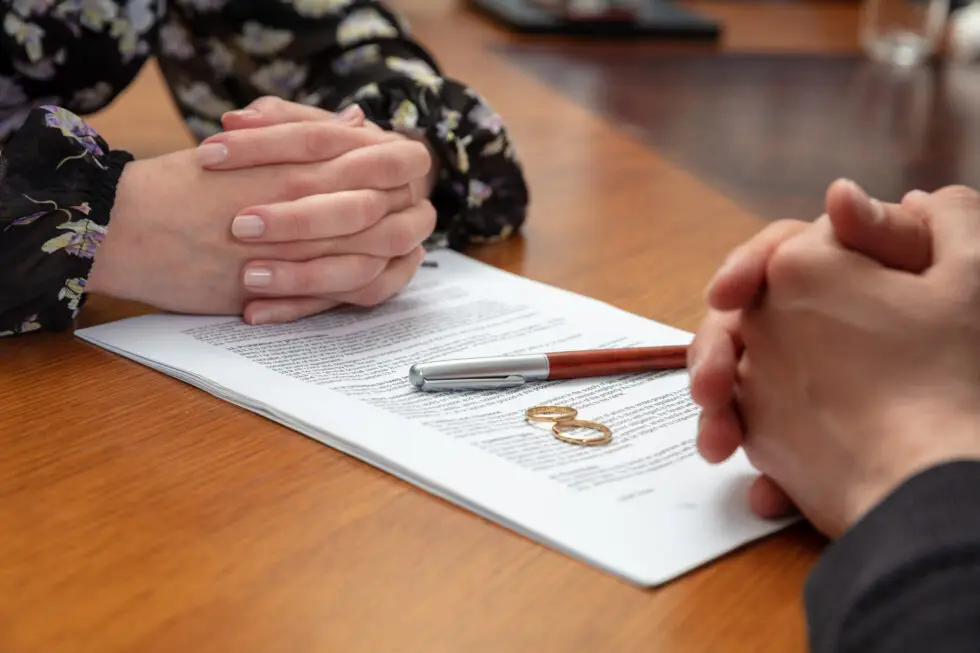What is Section 31 AufenthG and what does it apply to?
§ Section 31 of the Residence Act (AufenthG) regulates an independent right of residence for spouses after the dissolution of the marital partnership. Let's start by looking at the definition of the residence title and the requirements.
Definition of the independent right of residence after separation
After the dissolution of the marital partnership, i.e. after separation or divorce, you can obtain an independent right of residence if you meet the conditions under § 31 AufenthG.
This means that you can stay in Germany even after separation or divorce without your Residence permit being tied to the marriage, as was previously the case under Section 28 AufenthG for family reunification with Germans or for spousal reunification under Section 30 AufenthG.
This is particularly important if you have just separated from your spouse and are concerned about your own legal security. § Section 31 AufenthG ensures that you will continue to receive a residence permit under certain conditions and gives you the opportunity to stay in Germany even if your marriage no longer exists.
This means:
- You are no longer dependent on your spouse.
- Your residence permit can be extended for one year as long as certain conditions are met.
- This allows you to remain in Germany after the separation without your marriage affecting your residence status.
The legal text according to § 31 para. 1 sentences 1 and 2 is as follows:
Legal text: "The spouse's residence permit will be extended for one year in the event of the dissolution of the marital partnership as an independent right of residence independent of the purpose of family reunification if the marital partnership has legally existed in the federal territory for at least three years or the foreigner has died while the marital partnership existed in the federal territory and the foreigner was in possession of a residence permit, Settlement permit or EU permanent residence permit until then, unless he/she was unable to apply for the extension in good time for reasons for which he/she is not responsible."
Requirements for the independent right of residence according to § 31 AufenthG
Certain conditions must be met before you can make use of the independent right of residence under Section 31 AufenthG:
- Your marital partnership must have legally existed in Germany for at least three years.
- You must have a valid residence permit at the time of separation.
- In cases of hardship, for example if you are the victim of domestic violence as a spouse, exceptions to the 3-year rule can be made.
Attention!!!! You can also obtain § 31 AufenthG if your spouse is deceased. As in the case of separation or divorce, it is crucial that you meet the conditions for Residence permit .
Application for § 31 AufenthG
If you would like to apply for an independent right of residence under Section 31 AufenthG after a separation or divorce, there are a few steps you should follow. This process is important to ensure that your stay in Germany is legally secure. It is advisable to prepare well and submit the required documents in full to avoid delays.
Necessary documents
You will need several important documents to apply for an independent right of residence in accordance with Section 31 AufenthG. Make sure that all documents are up-to-date and correct. Below you will find an overview of the required documents:
- Valid passport: Please make sure that your passport is valid! The Residence permit is linked to the validity of your passport. If your passport is only valid for 3 months or 6 months, the Residence permit will only be issued for this period.
- Proof of separation or divorce: This includes the divorce certificate or an official letter confirming the separation.
- Marital partnership: Proof that the marriage has existed legally in Germany for at least three years (registration certificates or other official documents).
- Current registration certificate: A document that shows that you still live in Germany.
- Proof that you have sufficient means of subsistence: Evidence of your income or, if applicable, receipt of social benefits.
Complete and well-prepared documentation helps to process the application quickly and avoid unnecessary delays.
Duration of processing and issuance
The processing time for the application for the independent right of residence according to § 31 AufenthG can vary depending on how well your documents are prepared and how busy the responsible Foreigners' office is.
Typically, it takes time:
- Between 4 and 12 weeks: From submission of the documents to the granting of the extension.
- Additional processing time: If documents are missing or additional information is required, there may be delays.
Once your application has been approved, you will receive a residence permit for one year. During this year, you will have the opportunity to earn your own living and meet the requirements for a long-term residence permit or Settlement permit .
Make sure you keep in regular contact with your Foreigners' office to stay informed about the current status and submit additional documents if necessary.
What rights do you have after the separation?
After a separation or divorce, you not only have to deal with personal and emotional issues, but also with legal questions concerning your residence in Germany. Section 31 of the Residence Act gives you the opportunity to continue your residence independently of your former spouse. But what specific rights are you entitled to and what should you bear in mind in order to legally secure your stay?
Independent right of residence after divorce
After the divorce, you have the option of obtaining an independent right of residence that is no longer dependent on family reunification. This means that
- You are legally independent: Your residence in Germany is no longer tied to the marriage with your partner.
- You will receive a one-year extension: This extension gives you time to stabilize your professional and financial situation.
- Requirements must remain fulfilled: Even after the divorce, you must continue to comply with the conditions of § 31 AufenthG, particularly with regard to proof of subsistence.
Receipt of social benefits and effects on residence
A common issue that can cause concern after separation is the receipt of social benefits. Can social benefits jeopardize your residence?
The answer depends on certain conditions:
- First year after separation: You may receive social benefits in the first year after separation without this having a negative impact on your Residence permit . This should help you to find a new job during this transitional period and secure your livelihood independently.
- After the first year: At the end of the first year, you must be able to support yourself from your own resources. If this is not the case, the extension of your residence permit may be jeopardized.
Requirements for the extension of § 31 AufenthG
In order to obtain an extension of your residence permit in accordance with § 31 AufenthG, certain requirements must be met. These requirements are clearly regulated and must be proven:
- Duration of cohabitation: Your marriage must have legally existed in Germany for at least three years.
- Current Residence permit: You must have a valid Residence permit at the time of separation or divorce.
- Livelihood: You must be able to secure your livelihood independently after the separation, either through income or support that does not depend on your spouse.

What time limits and conditions apply to Section 31 AufenthG?
If you wish to remain in Germany after a separation, deadlines and conditions play a decisive role. The most important regulation here is the so-called 3-year rule, which stipulates how long you must have lived in a marital partnership in Germany in order to obtain an independent right of residence. In certain cases of hardship, however, it is possible to deviate from this rule.
The importance of the 3-year rule in residence law
The 3-year rule is a central condition in § 31 AufenthG. This rule stipulates that you must have lived in a lawful marriage in Germany for at least three years in order to obtain an independent right of residence after separation. In concrete terms, this means
- Marriage must have lasted three years: You and your spouse must have lived together in Germany for at least three years. This also applies if the marriage has now ended.
- Legal residence: Both spouses must have lived legally in Germany during this period, i.e. with a valid Residence permit.
- Proof of cohabitation: You must provide appropriate evidence that you and your spouse actually lived in the same home during this period (e.g. registration certificates).
Attention!!!! Since 18.11. 2023 there is a new regulation that the period for spouses of Blue Card holders is reduced to 2 years! So if your spouse has a Blue Card, the 2-year rule applies to you and you and your spouse only need to have lived together in Germany for 2 years!
Cases of hardship: When can the rule be waived?
However, there are special circumstances in which the 3-year rule is not strictly applied. In so-called hardship cases, the rule can be relaxed to allow those affected to continue their stay.
The cases of hardship are set out in Section 31 (2) sentence 2 AufenthG:
Legal text: "The requirement of three years of legal cohabitation in the federal territory in accordance with paragraph 1 sentence 1 number 1 or two years of legal cohabitation in the federal territory in accordance with paragraph 1a shall be waived if it is necessary to avoid particular hardship in order to enable the spouse to continue to reside, unless the extension of the residence permit is excluded for the foreigner."
It also states:
Legal text: "A particular hardship exists in particular if the marriage is invalid under German law due to the spouse being a minor at the time of the marriage or has been annulled, if the spouse is threatened with a significant impairment of his or her interests worthy of protection due to the obligation to return resulting from the dissolution of the marital partnership or if the spouse cannot reasonably be expected to continue to adhere to the marital partnership due to the impairment of his or her interests worthy of protection."
The interests worthy of protection also include, for example, if the welfare of your child living in a family relationship is at risk.
Attention!!!: The extension of your residence permit may be refused if your spouse is dependent on social benefits under the Second or Twelfth Code for a reason for which he or she is responsible.
The path from § 31 AufenthG to the Settlement permit
Once you have been granted an independent right of residence under Section 31 AufenthG, the question arises as to how you can secure your long-term residence in Germany. The next step could be the transition to Settlement permit , which gives you a permanent right of residence. But how do you go from temporary Residence permit to permanent Settlement permit?
Transition from independent right of residence to Settlement permit
The transition from a temporary Residence permit, which you received after separation or divorce under Section 31 AufenthG, to Settlement permit under Section 9 AufenthG is possible if you meet certain conditions. The procedure is usually as follows:
- 1 year independent residence permit: After you have been granted the independent right of residence for one year, you must prove during this time that you are able to support yourself.
- Proof of income: To apply for Settlement permit , you must show that you have a fixed income and are not dependent on social benefits.
- Language and integration: You are expected to have sufficient German language skills (generally level B1) and be well integrated into German society.
Requirements for applying for the Settlement permit
You must meet the following requirements in order to obtain Settlement permit in accordance with § 31 AufenthG:
Secured livelihood: You must prove that you are able to secure your livelihood independently. This includes:
- Regular income from employment or self-employment
- No claim to social benefits (after the first year)
Minimum period of residence: As a rule, you must have lived in Germany for at least 5 years. The time you spend in Germany with a Residence permit in accordance with § 31 AufenthG counts towards this period.
Language skills: German language skills at level B1 are required. You can prove this by taking an official language test or a recognized language certificate, for example.
Proof of insurance: You must provide proof of health insurance and sufficient pension provision, which is provided by statutory or private health insurance and pension insurance contributions. The contribution of 60 pension insurance months is a prerequisite for Settlement permit.
Conclusion on securing the right of residence after separation
As you can see, § 31 AufenthG provides important protection for your residence after a separation or divorce. Here we outline the key points again and take a look at the future of Section 31 AufenthG.
Key points of § 31 AufenthG
- Independent right of residence after separation: You will receive a one-year extension, regardless of your spouse's status.
- Duration of cohabitation: The marriage must have existed for at least three years in Germany, unless there are special cases of hardship.
- Securing your livelihood: After the first year, you must be financially independent in order to extend your stay.
Future of § 31 AufenthG
The regulations surrounding Section 31 of the Residence Act could evolve in the course of reforms to residence and migration law. It is possible that future amendments will further strengthen the rights of separated or divorced spouses. It remains important to stay informed and to take care of extensions and possible transitions to Settlement permit in good time.
FAQ - The most important questions about § 31 AufenthG
The term "Residence 31" refers to Section 31 of the Residence Act, which regulates the independent right of residence after the dissolution of a marital partnership. It enables spouses of foreign nationals to remain in Germany after separation or divorce, regardless of their ex-partner.
§ Section 31 (4) AufenthG states that the receipt of social benefits in the first year after separation or divorce has no influence on the extension of the residence permit. This gives you time to build up your own financial basis.
No, deportation after divorce is not automatic. Section 31 of the Residence Act allows you to obtain an independent right of residence, provided that the requirements (e.g. the 3-year rule) are met.
After separation, you are generally allowed to stay in Germany for one year if you are granted an independent right of residence in accordance with § 31 AufenthG. During this time, you must secure your livelihood in order to extend your stay.
No, the right of residence is not automatically extended after the divorce. You must apply for an extension of your residence permit in accordance with § 31 AufenthG and meet the requirements for this.
Yes, you can extend your independent right of residence if you can prove that you are able to support yourself independently and fulfill the other conditions of § 31 AufenthG.
Yes, after extending your right of residence in accordance with Section 31 AufenthG, you can apply for a Settlement permit if you meet the minimum length of stay and other requirements such as a secure livelihood.
To apply for Settlement permit , you must:
- Have lived in Germany for at least 5 years (including the time with § 31 AufenthG).
- secure their livelihood independently.
- Prove German language skills at level B1.
- Proof of health insurance and sufficient pension provision.










